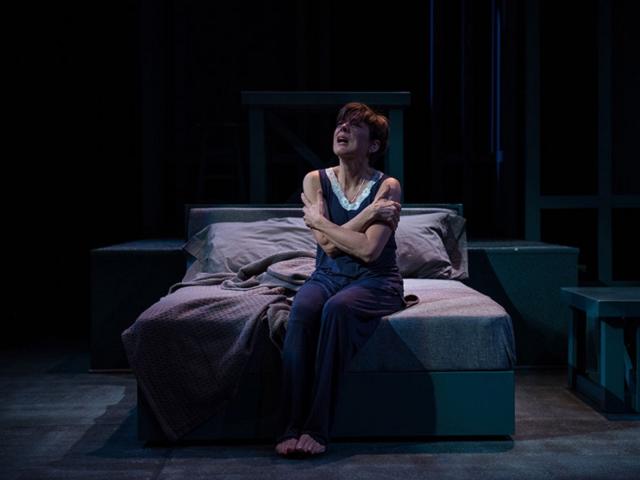
For better or worse, a debilitating illness can change a long-term marriage in myriad ways. That’s the focus of Obie Award-winning Adam Bock’s A Small Fire , in a production by Next Act Theatre. Emily Bridges, a hard-driving business owner in her 50s, must come to terms with “a new normal” after being inexplicably robbed of her senses in this thought-provoking and well-acted play. A Small Fire was first produced in 2011 Off-Broadway at Playwrights Horizons. Since then, it has been produced at several regional theaters across the country. This is the play’s first appearance in Milwaukee.
As Emily appears onstage, she is wearing a hard hat, jeans and fluorescent vest (costumes by Dana Brzinski). In comes Billy, the foreman of her construction crew. Their workday banter is easy and casual – all about construction costs and the crew’s performance. Emily (Mary MacDonald Kerr) is no-nonsense in her approach to work and, as we soon find out, her life. She returns home to her husband, John (Jonathan Smoots). They have an adult daughter, Jenny (Emily Vitrano), who is preparing to be married. When alone with John, Emily is not shy about sharing her dim view of the groom. John, the family peacemaker, tries to smooth things over. He is a quiet man who referees the prickly relationship between mother and daughter.
When John abruptly finds a smoldering fire on the kitchen stove in the next room, he chides his wife about not paying attention to the smell of smoke. This is when the audience learns that Emily cannot smell at all. It is this “small fire” that gives this play its title. It is also the innocuous event that indicates an upcoming upheaval to the family dynamics.
As one expects, Emily and John rush to seek medical advice. Doctors are puzzled as to the cause of Emily’s illness, and the audience never learns why her health is deteriorating. This is a somewhat difficult fact for us to accept, although is it really no less frustrating than learning of any real illness that does not have an immediately identifiable cause, or a cure? In any case, we are drawn to Emily’s dilemma and wonder how she is going to deal with it. Next Act Artistic Director David Cecsarini has the admirable task of directing a dream cast for this production. Some of Milwaukee’s best-known actors give richly textured performances that allows us to identify with each character. Cecsarini brings out the best in each performer. Things unfold so naturally that we almost feel the changes as they happen onstage. < p> Noted Milwaukee actor Mary MacDonald Kerr plays the main character (Emily). As she gradually loses the ability to smell, to see, to taste and to hear, the changes are mirrored in her facial expressions. Over time, her harsh features begin to soften, especially as she begins to feel alone and afraid. With each scene, she leans more heavily on John, who must take on more control of their lives. As the husband, Jonathan Smoots has less emotional room to flex than his hard-charging wife. In spite of this, Smoots excels at bringing out the nurturer in his character, while also wondering whether he is up to the challenge. Emily Vitrano plays a daughter who displays some of the same harshness as her mother, while also overlooking the mother’s faults as her father must do. It is a well-balanced performance and one we are sorry to see end when Jenny announces that she and her new husband are going to move to another state.
One of the most intriguing characters is Billy (Mark Corkins), the construction foreman. Corkins presents a sometimes reflective, sometimes over-enthusiastic portrait of a man who can loudly cuss out a co-worker or touchingly communicate with Emily when words are no longer an option. Billy even makes a well-intentioned attempt to “get John out of the house” as Emily commands by taking him along to a pigeon race. (John tries, but fails, to muster much enthusiasm for this outing.) Billy realizes that he, too, must compensate for Emily’s absence from work in ways he had not imagined. While it may seem easy to dismiss Bock’s play as a melancholy look on life, it is filled with moments of humor as well as an upbeat ending. There is a beautifully choreographed sequence in which Emily and John interact more intimately than they perhaps believed was possible. Afterwards. as they laugh, panting, on their bed, Emily realizes that an essential part of her still exists. She smiles, reveling in this hopeful discovery.
